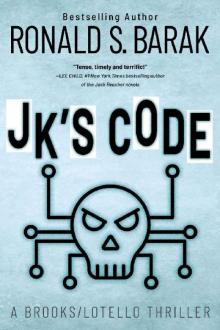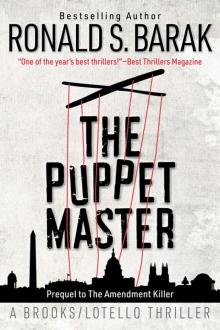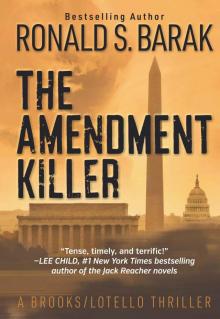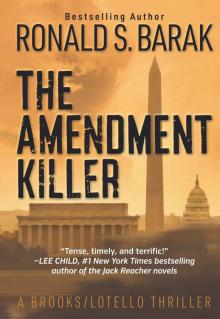- Home
- Ronald S. Barak
The Amendment Killer (Brooks/Lotello Thriller) Page 9
The Amendment Killer (Brooks/Lotello Thriller) Read online
Page 9
Brooks was in no rush. He wanted to be sure he had the nine Justices’s undivided attention. Finally, almost as an afterthought, he stated: “My colleague, Mr. Esposito, would have this Court interpret Article V as the exclusive means by which our Constitution can be amended. In every possible instance, requiring the intimate participation of Congress in the process. Justice Hirschfeld rightfully characterized that interpretation as enabling Congress to extort or hold hostage the governed with respect to any potential amendment of greater interest to the governed than the government.
“Had our constitutional forefathers intended such an extraordinary consequence in drafting Article V, surely they would have included the clear and simple sentence Ms. Klein has added to the above screen in uppercase highlighted letters. They would not have left such an extraordinary power to override the will of the governed to our imagination. They would have been oh so carefully explicit.
“My thanks again to Mr. Esposito for his gracious cooperation in making his technology available to Ms. Klein and me.”
Brooks ignored Esposito’s obvious ire and instead looked straight into Hirschfeld’s eyes, nodding to him ever so slightly. Cassie’s grandfather turned his head as if to avoid Brooks’s seemingly random but piercing glance.
A defining moment indeed, Brooks thought. I now know Hirschfeld knows I know.
Associate Justice Fred Nettleman, generally recognized for his quiet introspection, in contrast to the sharp style of Justice Taser, broke the interlude. “Excuse me, Judge Brooks, I get your point. But not your logic.”
“According to you, without the addition of your insert, Article V does not provide an exclusive means by which to amend the Constitution.” Justice Nettleman paused for effect. “But if our constitutional framers had envisioned alternative ways in which to amend the Constitution that did not require express authorization in the Constitution, then why was there any need to single out and set forth the supposedly non-exclusive single means embodied in Article V for such specialized explicit treatment?”
Precisely the retort Brooks had expected. And wanted. “Because, sir, I respectfully submit to you that Article V is not a provision of exclusive empowerment. As Mr. Esposito contends. Or a non-exclusive provision of empowerment. As you would appear to ascribe to me. Rather, sir, I believe Article V is a provision of containment.
“The people created the Constitution with no one’s blessing but their own. Certainly they can change on their own what they could make on their own.
“You will recall, of course, that this is our second Constitution. The people created the first one. On their own. They repealed it in its entirety. On their own. And they made a second one. Again on their own.
“The government serves at the pleasure of the governed. Not the other way around. The governed never need the permission of the government to set or revisit the rules that apply to the government. It’s only the government, under Article V, that must involve the governed if the government wishes to propose any changes.
“I humbly advise that the intent and purpose of Article V was to set forth the conditions under which our government might also venture forward into the field of constitutional amendment. But in a highly limited and arduous manner to protect the governed from any mischief on the government’s part.”
Brooks was sure he had caught those opposed to the 28th Amendment off guard. His argument had not previously occurred to Klein and so it was obviously not raised in NoPoli’s legal briefs in the lower court. Brooks had strategically chosen—for the classic tactical element of surprise—not to raise his interpretation of Article V in NoPoli’s Supreme Court papers.
Beyond doubt, Esposito wanted to immediately answer back. Brooks could see it on his face. And in his body language. But, alas, his allotted time for this session was exhausted during his own presentation. For better or worse, Esposito got to go first. But he was not entitled to any right of rebuttal. He would find some way to slide in an attempt at rejoinder on Thursday. Two days down the road would hopefully be too little, too late.
For the moment, that left only Hirschfeld. As if on cue: “Judge Brooks,” Hirschfeld said, “such speculation as to what the framers of our Constitution intended is just that, rank speculation. You should take great care when you presume to venture into matters beyond your purview.”
Seeing the laser-like glint in Hirschfeld’s eyes, which he assumed was meant only for him, Brooks did not back off. “You and I have no quarrel, Justice Hirschfeld. We understand one another perfectly. One only has to do the appropriate research, as I have, to move beyond mere speculation, and to know precisely what our forefathers—and grandfathers—intended.”
Brooks watched Hirschfeld frown. And again look away. Brooks silently vowed the utmost discretion in attempting to help Hirschfeld and his granddaughter.
To Trotter, Brooks said, “Mr. Chief Justice, I’ve concluded my remarks to the Court this afternoon. I thank the Court for its indulgence, and attention.”
Brooks promptly returned to and took his seat. The discernable drone in the courtroom was not lost on him. His unexpected interpretation of Article V had apparently taken most in the courtroom by surprise, including, he observed with no small satisfaction, his worthy opponent, Mr. Esposito.
“Very well, ladies and gentlemen,” Trotter announced, “we will stand adjourned until this Thursday morning at 10 o’clock.”
The nine Justices rose in unison and stoically exited the courtroom. Leaving the spectators—and the murmur—behind them.
CHAPTER 28
Tuesday, May 6, 3:00 pm
NISHIMURA HAD INFORMED her viewers that NBN-TV would be cutting away to the three o’clock news, but would present a one-hour special on the first day of Congress v. NoPoli that evening at eight o’clock. In her earpiece, she heard the words, “And . . . that’s a wrap. Great work everyone. In the studio at five sharp please to record our special.”
* * *
Cassie woke with a start. She remembered being unable to overcome her chills and deciding to lie down for a few minutes. According to the clock on her pump, a few minutes had turned into more than two hours. It must be the drug he forced into me.
She was feeling better, more clearheaded. Time to get up; figure out how to behave when the man returned. She rolled over onto her side. Ouch! What was that? She reached into the pocket of her jeans and found one of her golf tees poking her in the thigh. It made her laugh. First, losing her sandwich. Then getting the shakes. Now stabbing herself. What next?
To be sure, she was in big trouble. And she knew it. She was scared out of her mind. But it wasn’t the first time. Well, yes, it was the first time she’d ever been kidnapped. But it wasn’t the first time she’d even been in big trouble, and really scared.
When the doctors told her parents she had diabetes, she was in trouble. But she wasn’t scared; she was too young to understand. When she was a little older, her parents described her illness to her, and how she was . . . different. They explained to her that it was serious, but could be managed if she behaved responsibly. She didn’t know what managed meant, or how to do it. She was frightened. Big time. Her parents told her not to be, that they would help her. But she still was.
She stopped being afraid when she grew up. When she understood what “managed” meant, and how to do it. And that her fear served no purpose.
She thought back to when her golf was giving her trouble. She had lost a golf match. She was shellacked. It was horrible. She wanted to crawl into a hole and die.
Afterward, her coach had talked to her about what had happened. She said she felt terrible. He asked why. “Because I don’t like losing,” she answered. He asked if she had been afraid. She said yes. Again, he asked why. Unsure what to say, she said because people would think she was a loser.
“Cassie,” her coach said, “sometimes fear can be a good thing, but most of the time it’s not. It just gets in the way and stops you from performing as well as you can. And if you can�
�t always control it, never, ever let your opponent smell it on you.” It took Cassie a long time to fully grasp that, but when she finally did, she stopped losing matches. Well, she did lose one every now and then. But not many, and never to opponents who let her smell their fear. And she’s never been shellacked again.
Besides the fact that fear is seldom a good thing, both diabetes and golf had taught Cassie something else too: it’s sometimes okay—even nice—to let other people help you, but the very best help is the help you give yourself.
Cassie had no idea who this man was or what he wanted to do with her. And, yes, she was plenty frightened now, but it would not help her to let the man smell it on her. Never, ever.
* * *
Lotello used the pass Leah had given him the night before to get back into the courtroom. As he entered, the security officer told him they would be clearing the Court in a matter of moments. Lotello explained that he was there merely to collect his family and leave. He joined Brooks and Leah at their table.
“Nice job, Your Honor,” Klein said to Brooks. “Your gamble sure paid off. The eyes of several of the Justices were up from half-mast to full alert.”
Brooks nodded briefly to Klein as the two of them packed up their briefcases. When Lotello shot a glance at Brooks, Klein turned to the kids and said, “Time to go home, guys.” To Lotello, she added, “Will you be able to make it in time for dinner?”
Brooks responded for Lotello. “Mrs. Brooks drove us to Court this morning, but had some errands to run here in town after Court. May I borrow your husband to hitch a ride home? Save me the cab fare. Perhaps you would also be kind enough to deal with the press. So the detective and I can duck out the back and continue our lunch time discussion.”
Once they were alone in Lotello’s car, Brooks wasted no time. “So?”
“I think you had it right, Judge.” He pulled out his pocket-sized notepad, referring to it as he continued. “I first went to Cassie’s home. Her dad was a wreck, though he tried not to show it. He completely stonewalled me. Said that Cassie came home ill and was sleeping. Wouldn’t let me give her a message from Madison either.”
“Didn’t invite you in?”
“Not even close.”
“Next?”
“I traced Cassie’s route from the driving range to school.” Lotello produced and showed the broken eyeglass stem to Brooks through the clear plastic bag. “Found this on the street a little less than half-way between the driving range and the school. Looks like it matches the sunglasses Cassie wears, at least whenever I see her with my daughter, Madison. The area around where I found this seemed to have recently been swept up. I think Cassie was grabbed there this morning right after she texted Madison.”
Lotello flipped his notepad closed, and returned it and the plastic baggie to separate coat pockets. They climbed into his car and pulled out of the parking lot. They headed into the D.C. turnpike commuter traffic and rode in silence for a few minutes.
“Watch your DVR for a few minutes before you turn in tonight, Detective. Pay close attention to the grandfather’s remarks to Esposito during Esposito’s presentation. I believe Hirschfeld was talking to someone other than Esposito. Listen as well to his remarks to me near the end of mine. He was telling me not to get involved.”
“Will do,” Lotello said. “What’s your take on what I’ve said?”
“No question the girl has been abducted. Given Hirschfeld’s behavior in Court, we appear to be dealing with a group intent on sabotaging the 28th Amendment. They obviously have the poor man under their thumb. Our first concern, however, must be for the safety and welfare of the girl.”
“What does that mean, Judge? Just what are we free to do? What are we obliged to do? Especially when the family has told us both to butt out?”
“Well put. We need to address your question both legally and ethically. Let’s start with the law. Except for aiders and abettors, and certain professionals who work with children and must promptly report child abuse, broadly defined, to the authorities, the law does not require a third party to report any knowledge of a crime previously committed, in the process of being committed, or about to be committed.
Your Honor. You and I are professionals. Do we have to report our suspicions that Cassie is being abused? Also, there are at least two overlapping crimes here: the kidnapping of Cassie Webber and the apparent attempt to manipulate the outcome of a judicial proceeding, a felony obstruction of justice. You said our first concern is to save Cassie. What if that facilitates an obstruction of justice?
“The reporting exception is directed at school teachers, social workers, doctors, folks like that, who deal with children in their professional capacities. I doubt that it applies to other professionals, say an architect or an engineer, who just happen to stumble across an incidence of child abuse simply as a citizen. I think you and I fall into the latter category, but if not we’ve each reported our suspicions to one another. If the law would cast the net broadly enough to make you and I ‘reporting professionals,’ I would also argue that it should make you and I ‘authorities.’
Let’s turn to the other piece of the puzzle, shall we, our moral duties, before I respond to your question of possible conflict between the crimes of kidnapping, on the one hand, and obstructions of justice on the other hand.
“All ears, Judge.”
“According to historical writings, our laws derive from ‘sound moral principles.’
Thus, your and my legal responsibilities must be measured in terms of these sound moral principles. And good conscience as well.”
“You observed that the crimes here overlap. I’m not sure I agree. As a matter of moral substance rather than legal form, I believe there is only one crime being committed here. I don’t think we have to break that up, choose favorites, and prioritize.
“Bottom line, I’m morally unwilling to suffer the fool who sug gests that we must apply any law in a way that might injure the very person it is designed to protect. Our young victim.”
“Okay, Judge, that makes me a little more comfortable than I was. But what do we do now?”
“At the risk of further trying your patience, there are three possible avenues we can pursue based upon our newly decided freedom.
“One, we can do nothing, as the family apparently wishes. Leave all this entirely up to them. Part of me wants to do just that. But something about that troubles me.”
“Me too. Don’t we have some moral responsibility to Cassie independently of what her family wants? Even if she is a minor.”
“And what if there are more lives at stake, Detective?”
“I don’t follow.”
“There are eight other Supreme Court Justices. They all have loved ones. Why should we assume that Hirschfeld is the only Justice under assault?”
“Hard to imagine, but you could be right. I didn’t think about that.”
“Second alternative. We bring this to Chief Justice Trotter and let him decide what to do. The problem with this is that any one-sided communication with a judge about a pending case is prohibited. We would have to be willing to include Esposito in the process. Unless Trotter decided not to enforce the rule. While academically I have an ethical duty as an officer of the court to immediately report this to Trotter, that will almost certainly lead to a stay of the proceedings. That might be tantamount to signing the young girl’s death warrant. I’m not willing to take that chance.”
“Not only that,” Lotello said, “but this route would become even more complicated if there actually are other compromised Justices. Maybe even Trotter himself.”
“So, this brings us to the third option. Going to the authorities. Present company excluded. Or perhaps not excluded.
“So, Detective. What do you suggest?”
Lotello knew it would come to this. “I’ve accumulated a few favors. One of the lab guys at Metro owes me. I can get him to run the eyeglass stem for prints to see if anything shows up in any of our databases. Prints of C
assie and her family won’t likely pop up and hopefully won’t obscure any other prints that might be there. If I can reach him before he finishes up for the day, we should know one way or the other by early in the morning.”
“Good,” Brooks said. “And?”
“I can also go back this evening, knock on every door between the driving range and the school and see what I might find. There aren’t that many homes. I should be able to hit them all before it gets too late.”
“I like that step,” Brooks responded.
“I could also process footprint and tire track impressions in the area where I found the eye stem. But without more, someone who saw something, those results would probably be worthless.”
“Agreed.”
They drove on in silence for a few more minutes until Lotello pulled into the driveway of Brooks’s Georgetown condominium. Brooks got out, then leaned back into the car.
“Thanks for the ride. As far as I’m concerned, this is on me, not you. I’ve made the right decision, at least for the present. Taking this to you. The authorities. You’re investigating the matter.
“Call me on my cell whenever you have anything.”
* * *
As he entered the front door, Brooks called out, “Hello, dear!”
Maccabee sauntered into the entry hall and rubbed against his leg. That was it. No other response. Neither from Eloise nor Ryder. Probably out walking, he thought.
He exchanged his business suit for his favorite threadbare sweats and drifted into his office. He wanted to think through one or two things before hearing back from Lotello. He opened his computer, not because anything in there would help him, but because looking at the screen and typing out a few thoughts he could stare at usually helped him to think more clearly.
He and Lotello had discussed three alternatives. He listed them on the new electronic file he opened on the screen.
It wasn’t until he saw the list written out that it occurred to him there was a fourth option: He could also try calling Hirschfeld. He was pretty sure Hirschfeld’s home telephone number would be in their law school directory. He added the fourth option to his list.

 JK's Code (Brooks/Lotello Thriller Book 4)
JK's Code (Brooks/Lotello Thriller Book 4) Brooks-Lotello Collection
Brooks-Lotello Collection The Puppet Master
The Puppet Master The Amendment Killer
The Amendment Killer The Amendment Killer (Brooks/Lotello Thriller)
The Amendment Killer (Brooks/Lotello Thriller)